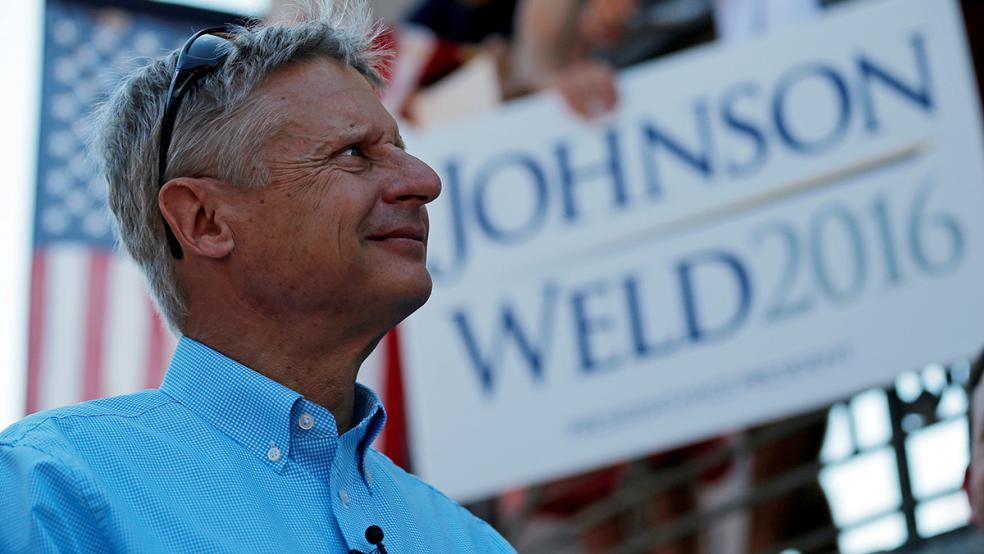There is little doubt that Gary Johnson’s high-profile effort to shake up the presidential campaign and transform the Libertarian party into a national force has dramatically failed over the past month or so, as his steady stream of gaffes and recent border-line defection by his vice presidential running mate conspired to sink his third party challenge.
In the latest New York Times national poll, Democratic presidential nominee Hillary Clinton holds a slender lead over Republican Donald Trump, 45 percent to 42 percent, while Johnson attracted just five percent of likely voters and Green Party nominee Jill Stein picked up four percent.
Related: Johnson Says the GOP and Democrats Are ‘Dinosaurs’ Headed for Extinction
Johnson, a former business executive and two-term Republican governor of New Mexico gave Clinton and Trump a mild case of heartburn as his promise of smaller government, balanced budgets and a less hawkish defense posture attracted independents, millennials and disaffected Democrats and Republicans desperately seeking an alternative. He denounced the two major parties as “dinosaurs” headed for extinction.
Johnson began to soar in the polls, got his name on the ballot in all 50 states and the District of Columbia, and came close to securing a third spot in the three nationally televised presidential debates this fall.
However, that appeal began to wane, political experts say, when the Clinton-Trump battle appeared to be going down to the wire and many voters who once flirted with supporting a third party nominee were suddenly reluctant to toss their vote away. Some might have been surprised as well as the Libertarian party platform that among other things called for the elimination of Social Security and other costly entitlements. Surveys that once found Johnson with support from 10 to 13 percent of voters now show him attracting only two to four percent support in the closing days of the campaign, according to a Huffington Post polling analysis.
That decline in support was apparent both in national polling averages and in critical battleground states like Florida, North Carolina, Ohio and Pennsylvania, where the election will be won or lost.
Related: Abolish Social Security? Gary Johnson's Libertarian Party Gets a Closer Look
Back in early September, when he was riding high and Clinton and Trump were relatively close in the polls, Johnson garnered eight percentage points in Florida, 14 percent in Ohio, 15 percent in North Carolina and nine percent in Pennsylvania, according to a Quinnipiac University poll conducted then. By contrast last week, Johnson was drawing just two percent of the vote in a four-way race in Florida, three percent in North Carolina, five percent in Ohio and three percent in Pennsylvania.
Whit Ayres, a veteran GOP pollster who advised the unsuccessful presidential campaign of Sen. Marco Rubio of Florida, said that third-party campaigns, for the most, part are “repositories” for people who simply can’t bring themselves to support either of the major party nominees. “However, the pattern of all third party candidates is that they decline as the election gets closer and it looks more and more like a vote for a third or fourth party candidate is a wasted vote,” he said.
Still, he cautioned, much of Johnson’s and Stein’s residual support in a four-way race for the presidency consists of dye in the wool protesters and reformists, who simply can’t bring themselves to vote for either Clinton or Trump in the general election. By holding together those remaining protest votes, Johnson and Stein could still play spoilers in determining the outcome of the election, just as Ralph Nader’s Green Party candidacy tipped the 2000 presidential election away from Democrat Al Gore and to Republican George W. Bush.
Related: As Johnson Loses Ground and Trump Self-Destructs, Clinton Gains Big
Yet Ayres and other political experts are at a loss to say whether Clinton or Trump will be hurt more by the third party vote on Tuesday
“It looks as though neither candidate is being disproportionately hurt,” Larry J. Sabato, a University of Virginia political scientist, said in an email. “The third party candidates have dropped like a rock, and their election day percentages may be even lower. When you consider that a good slice of these voters wouldn't back either Trump or Clinton if those were the only choices, I believe Johnson and Stein are mere footnotes to the election, unless it's a 2000-like squeaker--which it very probably won't be.”





